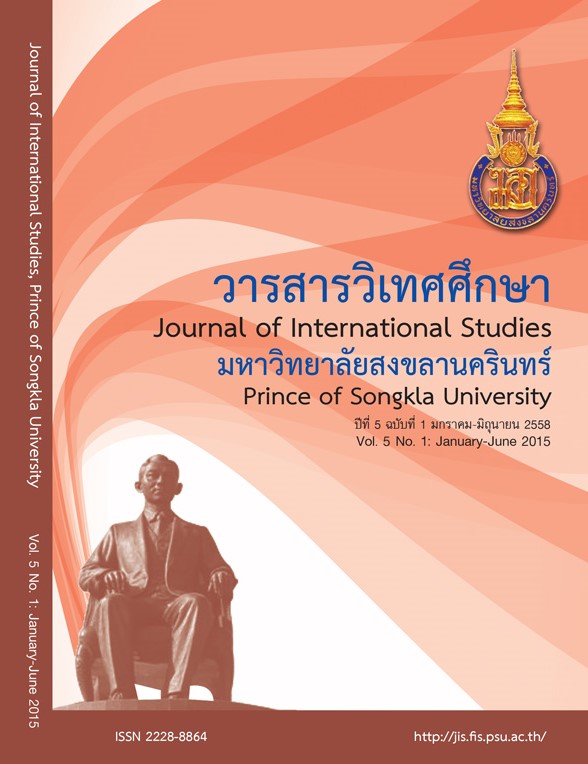A Comparative Study of Psychological Empowerment and Employee Commitment between Chain-affiliated and Independent Hotels in Krabi
Main Article Content
Abstract
The objectives of this study were to (1) measure the hotel employees’ psychological empowerment and employee commitment in Krabi, (2) compare the employees’ psychological empowerment and employee commitment between the independent and chain-affiliated hotels in Krabi, and (3) examine the relationship between psychological empowerment and employee commitment. This study targeted hotel employees in Krabi. A quantitative approach was applied. 480 questionnaires were distributed to hotel employees in Krabi. 376 completed questionnaires were submitted and usable. 141 were from independent hotels and 235 were from chain-affiliated hotels. The findings showed that the hotel employees in Krabi had moderately high levels of psychological empowerment. Hotel types had an impact on the employees’ psychological empowerment but no impact on employee commitment. Additionally, there was a positive relationship between psychological empowerment (competence, meaning, and influence) and employee commitment. The results of this study would help hotel managers to increase employee retention.
Article Details
Statements and opinions expressed in articles herein are those of the authors and do not necessarily reflect the position of the editors or publisher.
Article, information, text, image, etc. which are published in Journal of International Studies, belong to Journal of International Studies. If anybody or any organization would like to use part or whole of them, they must receive written permission from Journal of International Studies before usage.
References
personal control model: predictions of work alienation and
organizational commitment in Hungary. Journal of International
Management, 10(9), 375-92.
Bhatnagar, J. (2007). Predictors of organizational commitment inIndia: strategic HR roles, organizational learning capability and
psychological empowerment. International Journal of Human
Resources Management, 18(10), 1782-1811.
Chiang, C.F. and Jang, S. (2008). The antecedents and consequences
of psychological empowerment: the case of Taiwan’s hotel
companies. Journal of Hospitality and Tourism Research, 32(1),
40-61.
Ellickson.M.C., & Logsdon, K. (2002). Determinants of job satisfaction
of municipal government employees [Electronic version].
Public Personnel Management, 31(3), 343-358.
Fedor, D. B., Caldwell, S., & Herold, D. M. (2006). The effects of
organizational changes on employee commitment: A multilevel
investigation. Personnel Psychology, 59(1), 1-29.
Gazzoli, G., Hancer, M. and Park, Y. (2010). The role and effect of job
satisfaction and empowerment on customers’ perception of
service quality: a study in the restaurant industry. Journal of
Hospitality and Tourism Research, 34(4), 56-77.
He X, Shu B., and Heng V. (2010). Prevalent positive epistasis in
Escherichia coli and Saccharomyces cerevisiae metabolic
networks. Nat Genet. 42(3), 272-276.
Hrebiniak, L.G. and Alutto, J.A. (1972. Personal and role related
factors in the development of organizational commitment.
Administrative Science Quarterly, 17(3), 555-572.
Jaramillo, F., Prakash Mulki, J. and Marshal, G.W. (2005). A metaanalysis
of the relationship between organizational
commitment and salesperson job performance: 25 years of
research. Journal of Business Research, 58(11), 705-714.
Kim, B., Lee, G., Murrmann, S.K. and George, T.R. (2012). Motivational
effects of empowerment on employees’ organizational
commitment: a mediating role of management trustworthiness.
Cornell Hospitality Quarterly, 53(1), 10-19.
Kumar, V., Aaker, D.A. and Day, G.S. (1999). Essentials of Marketing
Research, John Wiley & Sons, Inc., New York.
Locke. (1976). Organizational behavior: affect in the workplace.
Annual Review of Psychology, 53(2), 282.
Meyer, J. P., & Allen, N. J. (1991). A three-component
conceptualization of organizational commitment. Human
Resource Management Review, 1(4), 61-89.
McGee, G.W. and Ford, R.C. (1987). Two or more dimensions of
organizational commitment: reexamination of the affective and
continuance commitment scales. Journal of Applied
Psychology, 72(8), 638-642.
Mowday, R.T., Steers, R.M. and Porter, L.W. (1979).
The measurement of organizational commitment Journal of
Vocational Behavior, 14(9), 224-247.
Price, J.L. and Mueller, C.W. (1986), Handbook of Organizational
Measurement, Pitman, Marshfield, MA.
Rue, L.W., & Byars, L.L. (1992). Management skills and application
(6th ed.). New Jersey: Prentice-Hall International.
Salazar, J., Pfaffenberg, C. and Salazar, L. (2006). Locus of control vs.
employee empowerment and the relationship with hotel
managers’ job satisfaction. Journal of Human Resources in
Hospitality and Tourism, 5(1), 1-15.
Schwepker, C. H. (2001). Ethical climate’s relationship to job
satisfaction, organizational commitment, and turnover intention
in the salesforce. Journal of Business Research, 54(1), 39–52.
Shaw, J.D., Delery, J.E. and Abdulla, M.H.A. (2003). Organizational
commitment and performance among guest workers and
citizens of an Arab country. Journal of Business Research, 56(5),
1021-1030.
Steers, R. M. (1977). Antecedents and outcomes of organizational
commitment. Administrative science quarterly, 22(1), 46-56.
Wang, C., H. Liu, S.-K. Lee. (2009). Impact of the Atlantic job
satisfaction and turnover. Geophys. Res. Lett., 38(6), 124-154.
Yamane, Taro. (1967). Statistics: An Introductory Analysis, 2nd Ed.,
New York: Harper and Row.
Yoon, M. (2001). The effect of work climate on critical employee
and customer outcomes: An employee level analysis.
International Journal of Service Industry Management, 12(5),
500–522.
Zikmund, V. (1993). Ability of the CHD patients to cope with stress
ful situations in various periods and spheres of the premorbid
life. Homeostasis, 34(13), 103-104.


